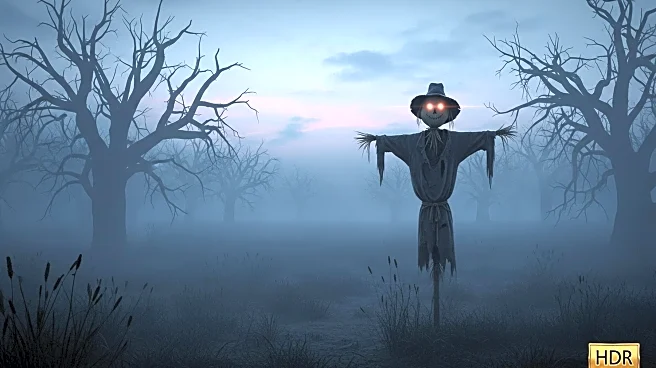What's Happening?
Silent Hill f, the latest installment in the Silent Hill series, has captivated players with a unique puzzle involving scarecrows dressed as schoolchildren wielding sickles. The puzzle requires players to solve cryptic riddles to identify the correct scarecrow, which will guide them to the next challenge and eventually out of the fog. Choosing the wrong scarecrow results in an attack, adding tension and urgency to the gameplay. The puzzle integrates elements of puzzle solving, paranoid dread, and combat, creating a memorable experience for players.
Why It's Important?
The scarecrow puzzle in Silent Hill f highlights the game's ability to blend traditional survival horror elements with innovative gameplay mechanics. This approach not only enhances player engagement but also reinforces the game's themes of love, longing, betrayal, and harm. By resisting brute-force solutions and punishing players for incorrect choices, the puzzle encourages strategic thinking and problem-solving, which are crucial skills in the gaming industry. The success of this puzzle could influence future game designs, encouraging developers to create more immersive and challenging experiences.
What's Next?
As players continue to explore Silent Hill f, they can expect more puzzles that challenge their problem-solving abilities and test their strategic thinking. The game's developers may use player feedback to refine future installments, potentially incorporating similar puzzle mechanics that emphasize narrative integration and thematic depth. Additionally, the game's reception could inspire other developers to experiment with innovative puzzle designs, further advancing the survival horror genre.
Beyond the Headlines
The scarecrow puzzle in Silent Hill f not only serves as a gameplay challenge but also reflects deeper themes within the game's narrative. The pressure to solve the puzzle amidst the fog and the threat of attack mirrors real-world feelings of anxiety and uncertainty. This connection between gameplay and emotional experience underscores the potential for video games to explore complex psychological and emotional themes, offering players a unique form of storytelling that extends beyond traditional media.









